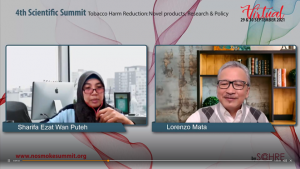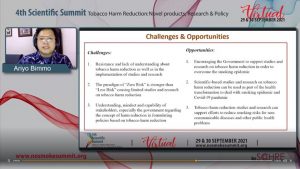A panel of distinguished experts from five Asian countries―Indonesia, Malaysia, Japan, India and Philippines―shared their Experience on Tobacco Harm Reduction, the discussion led by Professor Sharifa Ezat Wan Puteh.
Professor Rajesh N. Sharan through an introduction on the matter of Tobacco Harm Reduction (THR) focussed on India, Professor Sharan primarily addressed the smoking prevalence, stating that an estimated 1.3 billion people worldwide use tobacco products, of whom 80% are in low- and middle-income countries (LMICs). Projections suggest that by 2030, the tobacco related mortality will be four times higher for LMICs compared to high-income countries (HICs). In Asia, the smoking attributable mortalities continue to rise among Asian men in successive birth cohorts, while the tobacco smoking epidemic has increased in recent decades.
In India THR is dismal, Prof. Sharan said. There is a high nicotine misconception with illiteracy existing even amongst the medical healthcare professionals. Tobacco cessation centres and Nicotine Replacement Therapies (NRTs) are limited while in 2019, the government banned all THR products in India. The speaker concluded that the World Health Organizations Framework on Convention Tobacco Control (WHOs FCTC) and THR, have yet to be properly implemented in India.
The second speaker Dr Lorenzo A. Mata, president of Quit for Good, a non-profit organisation, discussed THR policies from the Filipino perspective. According to the Global Tobacco Survey (2015), there were approximately 17 million Filipino smokers. Of those, 76.7% thought or planned to quit smoking, yet only 4% successfully achieved tobacco cessation. Further, the Global Burden of Disease Report (2019), published that more than 117 million Filipinos die each year from tobacco related deaths.
The speaker suggested that alternative THR products should be made available. These include e-cigarettes and Heated Tobacco Products (HTPs), as they produce vapour and do not involve combustion. Even though they are not risk free, studies suggest that there is a significant reduction of exposure to harmful substances compared to combustible tobacco products.
Dr Mata, then discussed how current and future regulatory measures should be revisited and carefully calibrated. Currently, the Philippines do not have a comprehensive differentiated regulatory framework for THR products. Public health goals can be achieved with the right support and co-operation from appropriate stakeholders. Yet, the journey towards THR acceptance and better regulatory frameworks are not easy, as the Department of Health has publicly called for a ban of e-cigarettes. Through Quit for Good, the speaker suggested that the future should increase capacity building for advocacy, initiate local vaping research, continue THR education and re-consider differentiated legal frameworks.
Dr Hiroya Kumamaru, MD, PhD, Cardiovascular surgeon, then discussed how smoking is the biggest cause of morbidity and death in Japan, with the prevalence increasing to this day. In 2014, HTPs were launched in Japan. These included the IQOS by Phillip Morros International, the Glo by British American Tobacco and Ploom-Tech by Japan Tobacco. 27% of male and 25% of female tobacco smokers switched to HTPs, reducing the sales of combustible tobacco products (2019). In Japan, combustible tobacco cigarette related legislations are controlled by the Ministry of Finance (MOF), while THR products (e.g., e-cigarettes) are controlled by the Ministry of Health, Labour and Welfare (MOHLW) which implement stricter regulations. Dr Kumamaru concluded that HTPs are an alternative to tradition combustible cigarettes. Contributing to THR policies can help reduce the prevalence of smoking and may be a step towards achieving smoking cessation.
The third speaker, Mr Ariyo Bimmo, S.H, LL.M and Chairman of KABAR, Indonesia, (replacing Dr Amaliya Amaliya) shared the THR experience addressing challenges and opportunities in Indonesia. Indonesia is ranked with the third highest smoking prevalence in the world with 65 million active smokers. Tobacco control policies in Indonesia include advocacy and collaboration, ban on tobacco advertisements, health education, tobacco related taxes, creating non-smoking areas, smoking cessation counselling and THRs. Mr Bimmo addressed the current tobacco related challenges in Indonesia. These included, first, the resistance and a lack of understanding about THR. Second, fact that the paradigm of ‘zero risk’ is stronger than that of ‘less risk’ causing limited studies and research on THR. Lastly, there is a lack of understanding of stakeholder’s (e.g., the government), regarding the formulation of THR policies.
The speaker concluded by addressing three future opportunities regarding THRs. First, to encourage stakeholders to support THR research policies; second, to empower scientific research on THR for health transformation, and third, to support efforts in reducing smoking risks to reduce the public health burden.
The final speaker, Dr Asrul Akmal Shafie, a professor at the University Sains, Malaysia, discussed THR and the tobacco control strategies implemented in Malaysia. In 2004, the first strategy to control tobacco was established by banning advertising and tobacco sponsorships. In 2011 smoke-free public spaces were established. Since 2011, continuous enforcements have been implemented until today. Implementing these policies have reduced the smoking prevalence in Malaysia, however ‘Endgame’, a smoking prevalence rate below 5% is yet to be achieved. Dr Shafie pointed out that even though the smoking prevalence has decreased, tobacco related diseases are rising. The results may have been affected by external factors, but this does suggest that pursued strategies may not be achieving the Endgame target.
The challenges of tobacco control included, first, poor enforcement, failure of retailers to comply with the law. Second, social availability of cigarettes on teenagers, and third, availability of cheap and smuggled cigarettes across the borders due to inadequate border control. The speaker pointed out that in Malaysia, THR products were banned because of religious reasons concluding that accessing THR products through pharmacies will help reduce the prevalence of combustible tobacco products.
The chair, Professor Sharifa Ezat Wan Puteh closed the discussion panel by stating that LMICs face most of the combustible tobacco burdens, whilst different Asian countries face distinctive tobacco control challenges.




